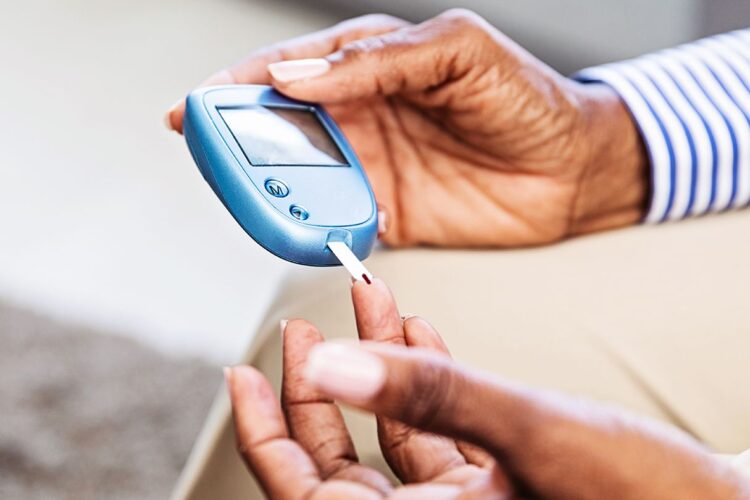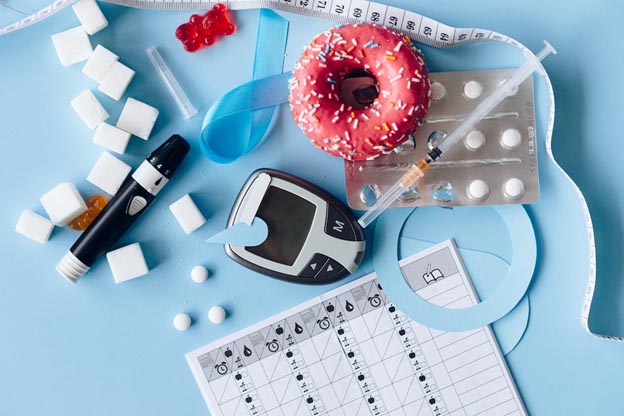
- By BlueBC_Admin
- In Blog
Diabetes in the elderly and its consequences?
Diabetes is a disorder that has numerous negative effects, including the inability of the body to maintain healthy blood sugar levels. However, as time goes on, diabetes’ consequences may intensify significantly. The disease can cause serious, even life-threatening complications from your head to your toes.
For example, having too much blood sugar, also known as glucose, might harm your body’s blood nerves and vessels. This may open the way for a variety of other illnesses such as Injury to feet or legs, renal disorders, stroke, vision problems, blindness, and stroke. Therefore, it is important to manage sugar levels to prevent the long-term harmful consequences of diabetes.

Read on learn to about harmful effects of diabetes on the elderly.
Consequences of diabetes in the elderly
1. Too Much High Blood Pressure
People with diabetes often have hypertension, which is another name for high blood pressure. When an older person has high blood pressure, they are more likely to have a stroke or a heart attack. High blood pressure can also hurt your kidneys, eyesight, and blood flow.
2. Depression
Depression is more common in older persons who also have diabetes. Managing the day-to-day stresses of living with diabetes can be exhausting and overwhelming, which has been linked to an increase in depressive symptoms.
In older adults, depression often manifests as:
- Sadness
- Having a persistent feeling of exhaustion
- The irreversible decline in excitement for past hobbies
- Trouble falling asleep or staying asleep, or sleeping too much
- Extreme weight gain or loss
- Feeling like you can’t keep up with your responsibilities
3. Urine Incontinence
Diabetes can damage the nerves in the bladder, which can make it hard to control your bladder. Those nerves might indeed tell your body that your bladder is full and you need to go to the bathroom. People with diabetes also often get bladder infections, which can cause them to leak urine.
Urinary incontinence can cause sexual problems, depression, and injuries from falling when you have to go to the bathroom quickly.
4. Memory Problems
People with diabetes who are older are more likely to have problems with their memory and thinking. This is called cognitive impairment. This can make it hard to think clearly, remember things, and make good decisions, among other things.
5. Nerve ache
In people with diabetes high levels of glucose (sugar) in the blood can damage nerves. This is called diabetic neuropathy. Damage can happen to nerves all over the body. People who have had diabetes for a long time and don’t control their blood sugar well are most likely to damage their nerves.
Neuropathy can make you feel like your skin is on fire, tingle, or go numb. It can also make it hard to feel things in your feet and cause other problems, like ulcers, with your feet. Neuropathy can also cause pain that doesn’t go away.
There are two different types of diabetic neuropathy. Peripheral Neuropathy and
Peripheral Neuropathy
The first type of diabetic neuropathy is called peripheral neuropathy, distal polyneuropathy, or DPN, which makes your feet, legs, hands, and arms less sensitive. It can also make it hard to move your limbs.
Autonomic Neuropathy
The second type is called autonomic neuropathy which affects your, heart, sweat glands, sex organs, urinary tract, eyes, and digestive system.
6.Falls
People over 65 are more likely to fall, which can cause serious injuries. This risk goes up even more if you have diabetes, which can affect your vision, balance, and ability to feel on your feet. Diabetes makes older people more likely to take more than one medicine, which can also make them more likely to fall.






